|
The Politics of Religion
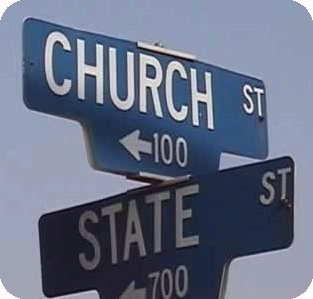
Introduction to the
Politics of Religion
Last Updated: May 2009.
Religion is almost everywhere. Even nonbelievers sometimes catch themselves saying words like 'God', 'Holy' and 'Jesus Christ'. It is because they were raised with religion and it has become part of the way they speak. It is their natural impulses to use their available vocabulary. Especially when angry or in pain.
That said, it makes a perfect metaphor for the interplay of religion and politics... religion effects many things, as a set of morals, as a source of fiction, as a kind of aesthetic (in architecture, art, music, etc.) and a guiding principle. As such there are often instances where different religions and their morals/principles collide. Sometimes there is even moral ambiguity, because the religion's founders/prophets/mesiahs weren't able to predict the issues that would face people in the future, issues like slavery, women's rights/feminism, common law relationships, contraceptives, capital punishment, homosexuality, abortion, stem cell research, evolution, invasive surgery, blood transfusions, climate change, global warming, cloning, religious wars, fanaticism and the war on terrorism.
As such the politicians elected to lead (or ruling using military power) often have to pay attention to what the population wants in terms of religious freedom and what morals they want to see enforced. So for example if a country has a majority religion that believes in capital punishment, but is against abortion, the government there will likely have rules supporting one and against the other. However if a country has multiple major religions, and they each have different views the government will likely err on the side of caution and try to respect the wishes of the people.
This often has very little to do with a god or gods, but instead is based on religious dogma and theory, interpretations of religious books written by men centuries or even millenia ago. For example in the Bible, no where does it say "thou shalt not have abortion", but it does say that people should stone homosexuals, adulterous women and murderers to death and that women should wear a headcovering when in public as a form of modesty.
Obviously we have become much more civilized and we're not stoning people to death or forcing women to wear headscarves any more. But we still adhere to some of the ideas found in such religious books.
There was a time when commonlaw relationships were illegal. Commonlaw relationships means two people, usually a male and female, living together but they are not married. Such relationships are increasingly common these days, to the extent that governments now treat such relationships the same as they do when dealing with married couples. From a legal standpoint, marriage is now obsolete and unnecessary. Some countries are even considering striking religion from the lawbooks, making it a purely religious event and thus something that governments won't interfere with.
Another example is how different countries treat religious holidays and whether they are given the day off from work on such holidays.

How Religions Interplay with Politics
1. Internal politics within large religious organizations (one's with significant political power). Example: The election of Pope Benedict XVI in April 2005, a German, despite the fact that most Catholics these days are Hispanic and live in South or Central America.
2. Religious beliefs and practices on civic processes (the organization's external politics). Example: Muslim women refusing to take off their headscarves when required to prove their identity when voting in an election.
3. Politicians performing a secular action which directly effects religious organizations. Example: Passing a law which requires all religions to pay land taxes for property owned, the same as charities and other groups.
4. Formal relationships between politics and religion, such as having an official state religion or a ruling theocracy. Examples: The official state religion of England is Anglican and the Vatican is ruled by the Pope.
Politics is often about conflict and debate. Its all about arguing a point of view and trying to convince the majority of people to adhere to that view in order to achieve a specific goal. If for example a religion had an edict such as "help the impoverished", the religion would push for more welfare funding, better education, work and apprenticeship programs. Religious politicians would argue in favour of those things, gain support from voters with similar beliefs, and presumably be able to make such changes after debating it. In this way religions can actually have a positive effect on society.
This power struggle however does not come without a price however. The same religious group might also believe in capital punishment and the religious persecution of people of different faiths. It can thus can be quite hazardous to a country's well-being when two religions that are hostile towards each other. Good examples are Sunni and Shia Muslims in Iraq, Catholics and Protestants in Northern Ireland, or Jews, Christians and Muslims in Israel/Palestine. A toxic mix of hostile religions will often lead to war or terrorism.
Thus when one religious group has control over a particular government, the other religious groups will often feel like they are being undermined or mistreated. The interaction between the government and those religions will cause miscommunication, misinformation and even outright propaganda against religious groups. Examples: The treatment of Jews by NAZI Germany during World War II, or the treatment of all religions (such as Tibetan Buddhists) under Communist China.
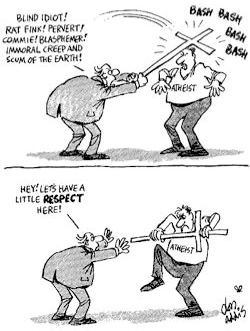
The Religious Double Standard
Politicians will sometimes try to effect a religious group's internal politics, and will involve factions with different perspectives regarding policies. These factions could even cause religions to fracture into two opposing religions, such as Protestants and Catholics over the issues of divorce, sex before marriage, contraceptives, abortion and corruption within the Church. And within Protestantism, different splinter religions who believe in a variety of things.
Generally speaking it is unwise for politicians to stick their noses into the business of religious affairs. A single poorly worded comment could ruin their chances of re-election or even lead to their almost immediate downfall.
However, when a religious leader sticks his or her nose into the realm of politics it rarely hurts their reputation or their ability to lead (often because they weren't elected and are difficult to remove from power once they are given a religious title). Some aren't even given their title but proclaim themselves as such. A prime example is televangelists in the United States, who frequently comment on political issues but face no repercussions because they are preaching to their believers whose natural response will be to support those ideas.
This double standard frequently causes strife (and can be seen in the mass media) when religious people and secular people become heated over a controversial issue.
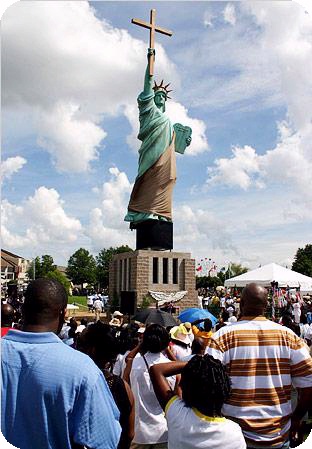
Secularism in Politics
Jesus commanded his disciples to "Render unto Caesar the things which are Caesarís, and unto God the things that are Godís", and yet somehow modern Christians have frequently forgotten this edict. The idea is simple. Leave politics alone and tend only to religious matters and politicians will do likewise.
The moment (and this can be proven historically) that religions cross over into the realm of politics, that is when strife is made. Excellent examples include Tibetan monks Vs the Chinese government, radical Muslims wanting to impose Sharia law (a literal interpretation of ancient Arabic laws, although its much more complicated than that) and any situation where the Church and State have become one ultimately results in rights being taken away, religious and scientific freedom being revoked and the state often dictating what people are allowed to think.
Secularism therefore is the exact opposite. Allowing people to have their religious and scientific freedom, and not getting involved in the personal beliefs of individuals. This is the status quo for many western cultures and is rapidly becoming the norm around the world.
However the problem with secularism is that not everyone agrees with it. Religious people who want to see church-state unity and want their beliefs imposed on others form special interest groups and religious organizations in order to pressure politicians into siding with them in an effort to make the government more religious.
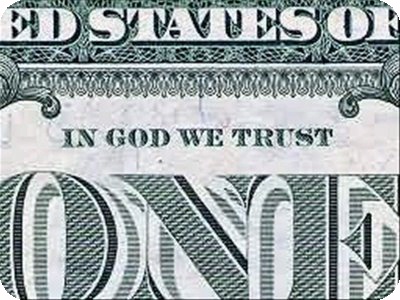
For example, the United States motto "In God We Trust", commonly found on American coins, was first used on the Great Seal of the United States in 1782, but later a Pennsylvanian minister pressured the addition of the words to American currency. The use of "In God We Trust" has been controversial however and American presidents such as Theodore Roosevelt strongly disapproved of the idea of evoking God within the context of a "cheap" political motto, but it remains to this day.
States frequently make symbolic religious gestures (often just in an effort to win votes amongst the religious) and overall try to remain secular. Sometimes however the symbolic gestures become open to literal interpretation and special interest groups will try to use it as an excuse to force more radical religious ideas into law and unto the general populace.
It is thus up to individual citizens to be vigilant and voice their opposition to moves towards radical religious laws, such as requiring the Lord's Prayer in public schools
"61% of Americans say religion and politics shouldn't mix." - Source: Boston Globe, 2005.
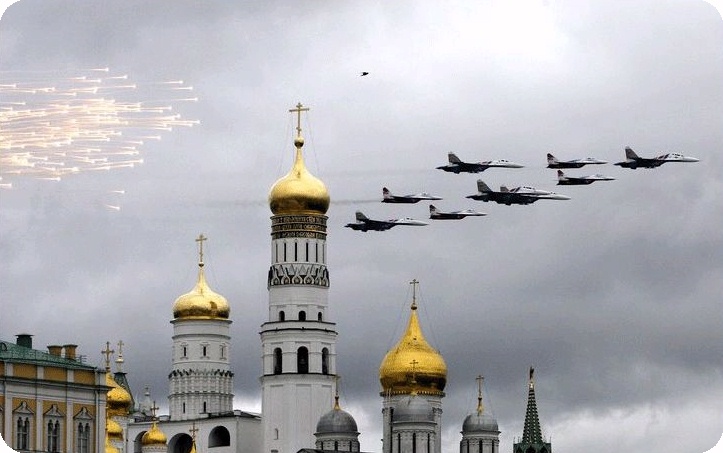
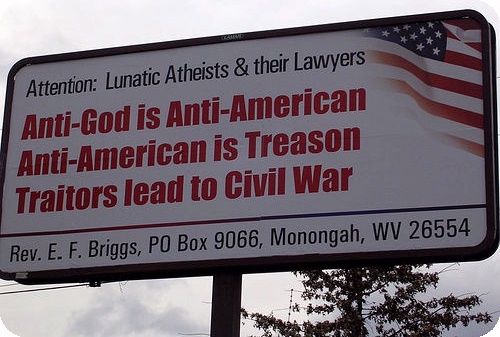
Religious Quietism
Vs Religious Activism
Some religions prefer and encourage their followers to avoid confrontation with the political sphere. This concept is known as Quietism or Religious Quietism.
Other religions endorse boycotts, attempt to censor or ban films (ie. The Golden Compass, Lord of the Rings, the Harry Potter franchise, various Disney movies including "Bedknobs and Broomsticks" or "The Sword in the Stone" because they feature magic, witchcraft and an alternative view of religion or god[s]). They also try to censor other cultural items such as paintings, sculptures, music, pornography, erotic poetry (including the Song of Solomon), scientific books about evolution, genetics, the human body and the origins of the universe (ie. the Big Bang Theory) and even roleplaying games such as Dungeons & Dragons. Religious activism is sometimes fruitful in censoring something or creating a false stereotype.

For example, in 1931 the Art Gallery of Ontario was forced to remove a painting containing nudes by Canadian painter Bertram Brooker, because the conservative religious public thought the nudes were too scandalous. Brooker, a religious man, was puzzled by this turn of events and decided to fight back however, writing an essay called "Nudes and Prudes" in which he explained that art is a religious experience because you are creating in the same way god created universe, and by creating things it brings people closer to god. He also argues that nudity is natural, the way god intended humans to be, and that religious folks should be ashamed of themselves for trying to censor god's creation. Thus Bertram Brooker managed to fight religious conservativism with religious idealism.
Sometimes religious activism can be used for a good purpose, such as trying to get rid of poverty, to stop war, halt environmental pollution and protect animals (in the Bible god made mankind caretakers of the earth), but all too frequently people try to use religion to force ideas on other people that have nothing to do with god, where we came from and whether there is an afterlife.
Abstaining from such activity (or avoiding the mention of god or religious reasons while doing such activities) is much more acceptable. For example, if a person is opposed to abortion because they've been raised thinking its a sin, that is religious activism at work. On the other hand if they are opposed to abortion for purely moral reasons, and possibly other reasons such as economics, etc. then it is a matter of just regular run-of-the-mill activism. Pro-lifers far too often cite religious reasons (despite the fact the Bible says nothing about abortion) and fail to come up with solid moral arguments.
SPECIAL NOTE: Up until roughly the 1920s it was traditional for a young, unmarried pregnant woman to visit a nunnery to either have an abortion or give birth to the child. Often if the child was undesired the nuns would smother the baby with a pillow and declare it was a still-birth. This practice has long since faded out and religious people will deny the practice of nuns smothering babies ever existed, but if you do some research you will find this practice did indeed occur and just isn't spoken about very much.
Most people (religious or not) have never written a letter or email to their politicians. They are what Richard Nixon referred to as the silent majority, and thus exercise Quietism. Only when new laws or events effect their lives personally do they ever decide to get involved and voice a complaint.
Theologians and clergy have different views on religious activism. Clergy prefer to stick to less controversial issues such as promoting environmentalism, helping the poor and general good deeds for their fellow mankind. These concepts are common to almost all religions. Some clergy members however try more controversial things, such as openly trying to convert people from competing religions or badmouthing other religions in an effort to gain more followers. Theologians, as students of many religions, have a tendency to analyze the effects of religion and how mankind uses religion towards various goals and thus often become experts on the positive and negative effects of religious activism.
"If anti-abortionists spent half as much time getting rid of poverty as they spend trying to get rid of abortion poor women wouldn't need abortions as often anyway." - Open Letter to Anti-Abortionists
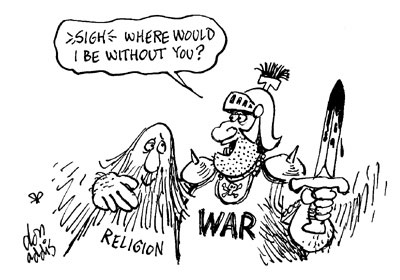
Religion, Terrorism & War
Religious extremism and the belief that theirs is "the one true god" has led to numerous wars over the centuries. Indeed almost every war has used religion as an excuse, or was itself the primary reason for the conflict. Observers of such conflicts are quick to point out the sheer idiocy of such wars and that fighting over theological debates, such purely theoretical ideas, is often not about the religious beliefs themselves but rather about religious ignorance and a lack of tolerance.
The best examples of religious extremism leading to terrorism and war is the current global conflict between conservative Christians and radical Muslims. September 11th and George W. Bush's War on Terrorism were caused by two things: 1) The global oil shortage; 2) The animosity between Christianity and Muslims, stemming from ignorance and a lack of religious tolerance. If the people of the United States, Iraq, Afghanistan and various other countries knew more about the religius/economic/political history of their enemies, the terrorist acts and these wars would have been deemed completely unnecessary.
People would be better advised to learn more about other people and their beliefs, preferably straight from the source, so they can decide for themselves what to think about other religions, cultures or countries. Far too many people take an extremist (or just plain lazy) view when dealing with other cultures, languages and religions and have an overall aversion to learning. This is a sign that something is wrong with our education system and the need for schools to be teaching more about religions... all religions.
If we look around the world at the different education systems we find that those countries with lower education and a stronger influence of religion in politics, these countries are the most war-like.
One of the very few benefits of the current war is that some Americans have bothered to take the time to learn more about Muslim cultures, something they wouldn't have done if there had been no war to stimulate their curiousity. Former U.S. President George W. Bush still believes that his actions will some day have been worthwhile, bringing democracy to the middle east and bringing Islam violently into the 21st century. Critics argue that peace and trade would have done the same thing with better results, instead of sparking revenge-inspired terrorists who may some day come back to haunt the United States.

Quotes about Religion & Politics
"The problem to be faced is: how to combine loyalty to one's own tradition with reverence for different traditions." - Abraham Joshua Heschel.
"When I do good, I feel good; when I do bad, I feel bad. That's my religion." - Abraham Lincoln.
"That I am not a member of any Christian Church, is true; but I have never denied the truth of the Scriptures; and I have never spoken with intentional disrespect of religion in general, or of any denomination of Christians in particular." - Abraham Lincoln.
"Lighthouses are more helpful than churches." - Benjamin Franklin.
"A tyrant must put on the appearance of uncommon devotion to religion. Subjects are less apprehensive of illegal treatment from a ruler whom they consider god-fearing and pious. On the other hand, they do less easily move against him, believing that he has the gods on his side." - Aristotle.
"Among politicians the esteem of religion is profitable; the principles of it are troublesome." - Benjamin Whichcote.
"Although he's regularly asked to do so, God does not take sides in American politics." - George J. Mitchell.
"In religion and politics people's beliefs and convictions are in almost every case gotten at second-hand, and without examination, from authorities who have not themselves examined the questions at issue but have taken them at second-hand from other non-examiners, whose opinions about them were not worth a brass farthing." - Mark Twain.
"Those who say religion has nothing to do with politics do not know what religion is." - Mohandas K. Gandhi.
|